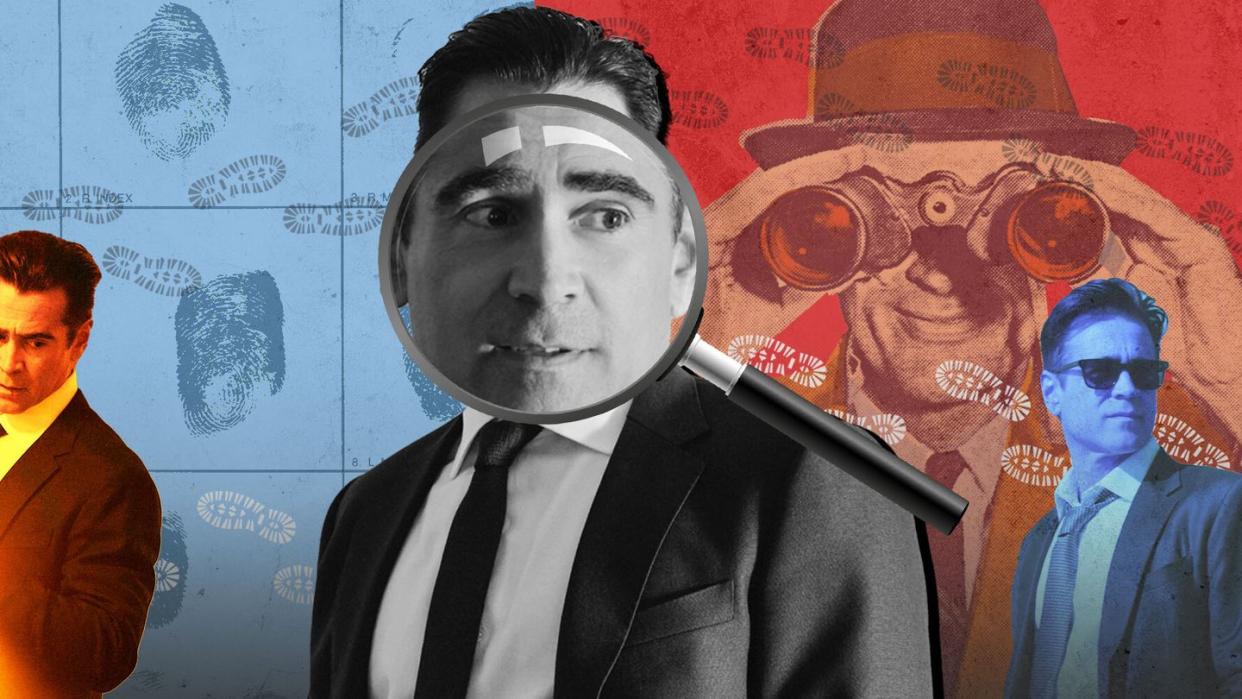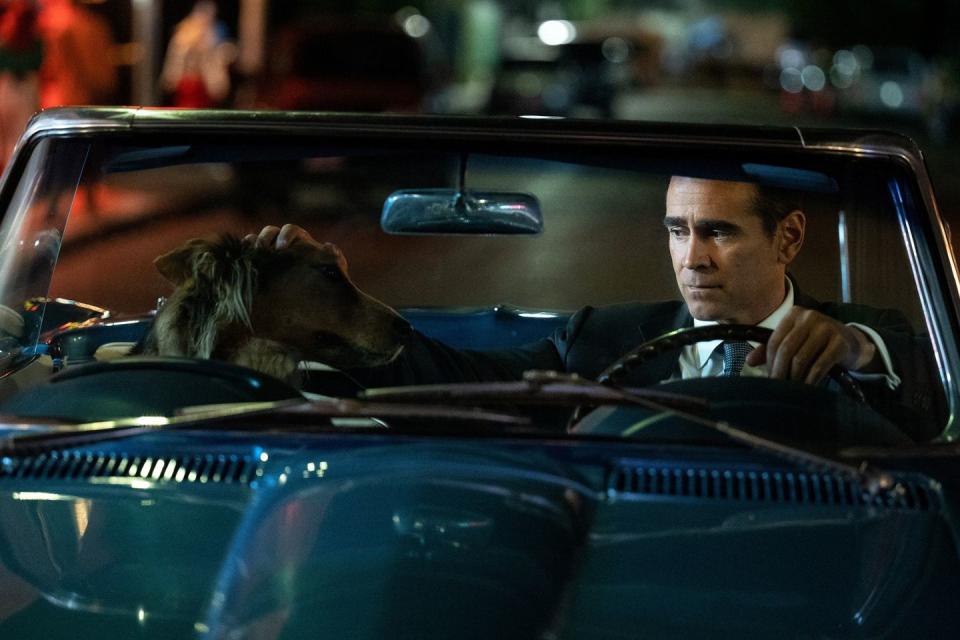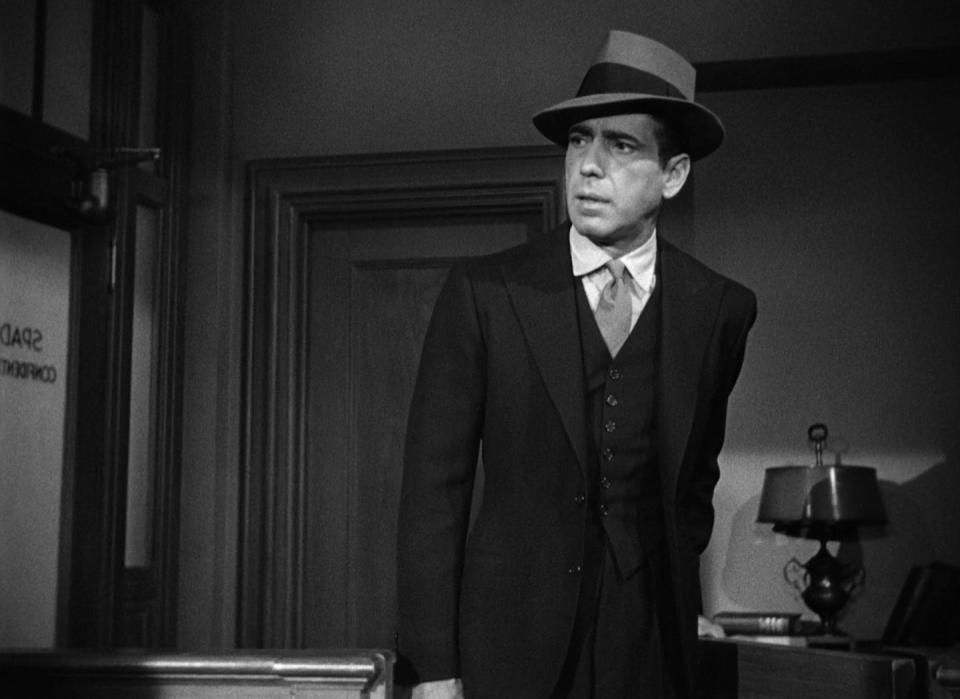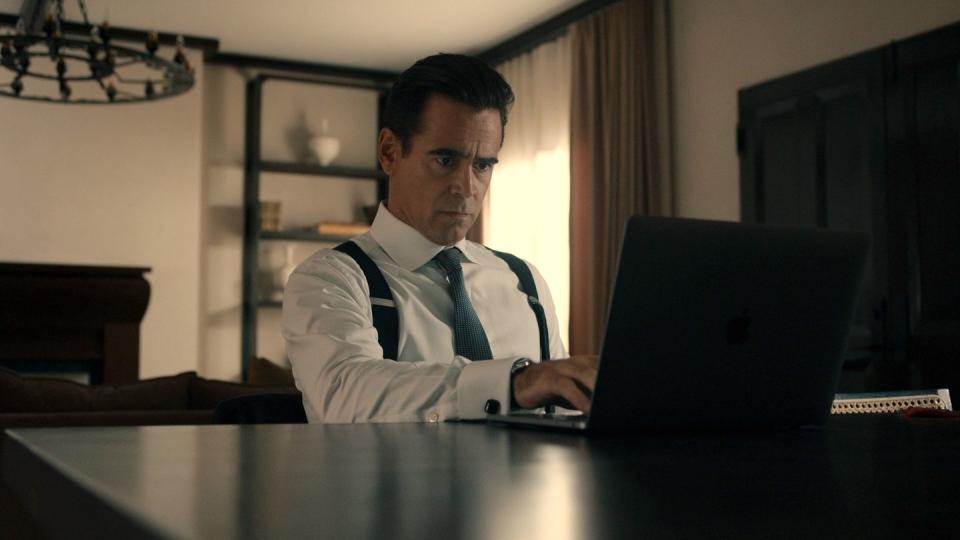The Real Reason We're So Obsessed With Detective Shows

- Oops!Something went wrong.Please try again later.
- Oops!Something went wrong.Please try again later.
- Oops!Something went wrong.Please try again later.
- Oops!Something went wrong.Please try again later.
- Oops!Something went wrong.Please try again later.
"Hearst Magazines and Yahoo may earn commission or revenue on some items through these links."
THERE'S NOTHING QUITE as classic as a detective in a film noir. Someone who takes on a job, commits to it, maybe gets a little too obsessed along the way, and looks damn good the whole time. This type of story—broadly defined as a mystery that follows a cynical or world-weary lone hero through a journey often filled with sex, violence, and intrigue—has been around for nearly a century. The first film noir is commonly cited as 1940's Stranger on the Third Floor, while timeless classics Double Indemnity, Gilda, and The Maltese Falcon are among the many that followed in the years after.
But while uber-popular phases of movie genres—think Westerns between 1945 and 1965, and even the superhero boom of the last 10-15 years—have fallen off in the years following their peaks, there's always been a spot here and there for a modernization, reinvention, or overall dive into the world of detective noir. Sometimes, these stories take different forms—Prime Video's hit Reacher has a massive brute with a heart of gold at its center, but is, for all intents and purposes, a detective mystery show; Peacock's Poker Face follows a drifter played by Natasha Lyonne who nonetheless solves a mystery each week. But the latest entry in the genre, Apple TV+'s Sugar, is something almost entirely classic, and a perfect excuse to dive into what makes these types of characters and these types of stories so endearing for so long.
Now, I say that Sugar is almost entirely classic for one very important reason. The show features Colin Farrell as the titular private investigator, a man named John Sugar, and Sugar is every bit the lone wolf lead that fans of the aforementioned films would come to expect. In fact, he's a fan of those movies, citing them often and subscribing to Sight and Sound magazine; the show is frequently intercut with clips from the old movies that have not only influenced the character, but the show itself. However, Sugar has one major twist in its back end that brings another genre into its conversation—but that twist doesn't affect the noir-iness of the story, and so we won't be spoiling it here.

What's essential for Sugar—and any entry in this genre—is a lead character who audiences can relate to and understand. We're spending the majority of our time seeing things through their eyes, often hearing a brooding, moody voiceover; whether it's Humphrey Bogart, Colin Farrell, or anyone in between, they need to anchor us in their world. It needs to be someone who's conceivably tough enough to strike fear into bad guys, but tender enough to also be a romantic lead. In other words: they need to be a movie star.
"This was the modern equivalent of the cowboy on the frontier," Eddie Muller, the host of Turner Classic Movies's Noir Alley and the author of Dark City: The Lost World of Film Noir tells me. "He's a loner, but he's driving a car instead of riding a horse. He's carrying a different kind of gun, but he's doing a job for somebody for hire. And the romanticized image of that character has never gone out of style."
Taking on a job is core to the genre, and it continues even in the most modern iterations. Sugar, for example, follows the titular character as he searches for the missing granddaughter of a legendary film producer (Remember: he's a big movie buff). There are twists and turns along the way, making for a nice mix with double-crosses, new characters to interrogate, potential femme fatales, and all sorts of wrenches that could be thrown right into the story as things play out.
But it's the presence at the center of it—through all the ups and downs—that keeps the viewers on board.

"There's a strength and certainty to those characters, and an old fashioned masculinity that's appealing to both men and women," Simon Kinberg, the showrunner of Sugar, says, emphasizing that they can also be something of a portal to a different era. "The look is really so cool. A guy in a suit with with a tie, with his hair combed—it feels like there's something safe and slick about that look, and there's just an appeal to it. In that old fashioned way, a guy in a suit with a with a tumbler of whiskey in his hand is eternally appealing, and doesn't really show up in our real world in the same way anymore."
That classic look can also be a major appeal. In the last year alone, Liam Neeson (in Marlowe), Clive Owen (in Monsieur Spade), and Farrell (in Sugar)—coincidentally all from the U.K.—have taken on classic, noir-style detective roles. "It's funny that in a way, these actors are trying to be like, the ultimate American archetype, which is this loner, private eye character that's become the new version of American mythology," Muller says.
It's also a chance for actors known for doing out there, extravagant things, to make sure audiences know they're still capable of being, to put it simply, cool. Sugar is the first of two planned TV projects for Farrell in 2024, as later this year he'll be reprising his role as The Penguin in a limited series of the same name. But where he's unrecognizable as the character he originated in 2022's The Batman, under hours and hours of prosthetics, Sugar gives him a chance to look like the Colin Farrell everyone knows and loves.
"Colin’s become a really interesting character actor," Kinberg says. "He's done a bit of everything these days, so it was fun to put him in old fashioned movie star mode."
Muller sees the appeal, too. "It's a good look for an actor," he says. "How could Colin Farrell say no to this part? You're almost infallible, but you're vulnerable. You're a nice guy, but you get to pound everybody. I think that's the appeal to men. It's why they like these roles—the detective is always right, but he's kind of out there on his own."
In creating a noir piece, there can also be a desire to try keep things fresh—to some degree. Laura Miller, who positively reviewed Sugar for Slate, says it's tricky to add something new to a genre when the audience is already very familiar with it—and some are even fans because of that familiarity. "When people do a departure, it's a very careful dance between giving the audience enough of what it wants, while also trying to do something original," she explains.
She notes that where so many of the stories in the genre's history—including the likes of more modern takes like L.A. Confidential, Justified, and even Reacher—have main characters rooted in anger, Sugar keeps things fresh by having its lead keep a level head. "Even when people are doing things that would annoy anyone else, or would piss them off, he just handles it really calmly. I would guess that he's unusual in that way in American pop culture, and I think super interesting for that reason, because I think it's a reaction to the general rage-a-holic in American life. Everybody's just mad, talking about how mad they are. And here's this person doing the right thing, but not ranting and raving about it, or just randomly punching people."
Not that Sugar never punches people—he just only does so when he really needs to. Violence is, after all, a core part of the noir story.
The base of a film noir and detective story—a mystery, a lone brooding hero, a femme fatale, etc—is always going to be key to the genre and how it functions. But that doesn't mean there's not going to be room for it to evolve. "It would be really interesting if Sugar ushered in a new sort of type of detective who's not just always carried away by his emotions," Miller says, "But who is more detached, or above at all, in a certain way."

These stories are always going to be relevant, because while real life is often confusing and chaotic, it can be delightful to open a book, watch a movie, or turn on a show where you follow along with a character who can use his wits alone to make some sense of it all. Is that realistic to real life? Maybe not. But isn’t that the point of fiction?
"I love the idea of someone who creates order from disorder," Kinberg says."We live in these really chaotic, crazy, overwhelming times, and there's more information channeled into our brain in a given day than when I was growing up I probably had in a given month or even year. So, the idea that someone can surf through all of that, and find a nugget of truth, or something that brings the universe together in something singular, is really appealing to me."
As Sugar wraps up its twisty, genre-bending first season, noir and detective lovers won't have to wait long for more—Reacher will return for a third go-around, Poker Face will return for a second run, and Prime Video's Cross (the latest adaptation of James Patterson's book series) should give the opportunity to scratch that itch. But perhaps the best bet to dive back into noir world might be Lady in the Lake, Apple TV+'s adaptation of Laura Lippman's novel of the same name—starring Natalie Portman and based on a real-life 1960s mystery. Coincidentally, of course, that series has the same name as yet another Sam Spade/Humphrey Bogart noir tale.
Which leads us to the real best way to tide the time. That's right: the classics. Film noir has lasted—in its many forms—for nearly 100 years. And if the past is any indication, it's likely to last 100 more.
You Might Also Like

